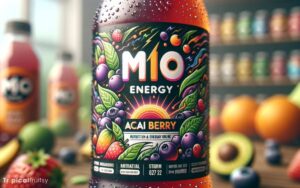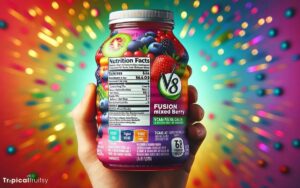Is Acai Berry Good for Acid Reflux? Unlock the Potential
Acai berries may be beneficial for individuals with acid reflux due to their anti-inflammatory properties, but they should be consumed in moderation.
Studies suggest that their antioxidant content can help combat oxidative stress in the body, which is linked to inflammation.
However, since they are a fruit, they do contain natural sugars and could potentially trigger acid reflux symptoms in some individuals.
It is essential to incorporate acai berries into a balanced diet and to monitor individual responses to the fruit.
Acai berries have gained popularity as a superfood, and for good reason. They are high in antioxidants, fiber, and heart-healthy fats, which can help reduce inflammation in the body.
For those with acid reflux, the anti-inflammatory effect might provide some relief. However, the impact of acai berries on acid reflux symptoms can vary from person to person, and it’s important to keep in mind the following points:
As with any dietary change, it’s crucial to consider how acai berries affect your specific health needs and acid reflux symptoms.

Key Takeaway
Acai Berry & Acid Reflux: Nutritional Benefits & Considerations
| Nutrient | Benefit for Acid Reflux | Considerations |
|---|---|---|
| Antioxidants | Reduce oxidative stress and inflammation | Overconsumption may trigger reflux in some |
| Fiber | Supports digestive health | Can cause bloating or gas in sensitive individuals |
| Healthy Fats | Anti-inflammatory effects | High-fat foods can exacerbate reflux symptoms |
Understanding Acid Reflux

Acid reflux, a condition affecting millions of individuals worldwide, occurs when stomach acid flows back into the esophagus, causing irritation and discomfort.
This backwash, known as gastroesophageal reflux (GER), can lead to the inflammation of the esophageal lining, a state referred to as esophagitis.
The primary mechanism behind acid reflux involves the dysfunction of the lower esophageal sphincter (LES), a muscular valve that regulates the passage of contents between the esophagus and stomach.
Factors contributing to the weakening or relaxation of the LES include dietary habits, obesity, certain medications, and hiatal hernia.
Persistent acid reflux can evolve into gastroesophageal reflux disease (GERD), a chronic condition requiring medical intervention due to the potential for complications such as Barrett’s esophagus and esophageal adenocarcinoma.
Nutritional Profile of Acai

Transitioning from the physiological underpinnings of acid reflux, it is essential to examine the nutritional composition of acai berries to assess their suitability for individuals with this condition.
Acai berries are touted for their dense nutrient profile, which includes:
- Antioxidants: Crucial in mitigating oxidative stress and inflammation, potentially soothing irritated esophageal linings.
- Fiber: Aids in digestion and promotes a feeling of fullness, which may prevent overeating that exacerbates reflux symptoms.
- Healthy Fats: Omega fatty acids are known for their anti-inflammatory properties, possibly beneficial for acid reflux sufferers.
- Vitamins and Minerals: A spectrum of micronutrients supports overall health and well-being, crucial for those managing chronic conditions.
This evidence-based overview suggests that acai berries might offer a nutritional advantage.
Acai Berry’s Impact on Digestion

The consumption of acai berry influences digestive processes through its fiber content and anti-inflammatory properties, which may have implications for managing acid reflux symptoms.
Dietary fiber is known to promote bowel regularity, potentially reducing the pressure on the lower esophageal sphincter that can contribute to acid reflux.
Moreover, the anti-inflammatory effects can soothe the gastrointestinal tract, potentially alleviating symptoms associated with acid reflux.
| Component | Effect on Digestion | Relevance to Acid Reflux |
|---|---|---|
| Dietary Fiber | Enhances bowel regularity | May reduce esophageal pressure |
| Antioxidants | Reduces oxidative stress | Potentially soothes the GI tract |
| Anti-inflammatory | Alleviates inflammation | Could decrease reflux symptoms |
| Anthocyanins | Supports gut health | May improve overall digestion |
| Fatty Acids | May improve intestinal barrier | Could protect against reflux |
Evidence suggests that a balanced intake, mindful of acai’s acidic nature, is prudent for individuals with acid reflux.
Research Findings on Acai

Recent studies have shed light on the effects of acai berry consumption in relation to acid reflux, with findings that point to both potential benefits and considerations for individuals with this condition.
- Acai berries contain antioxidants that may protect esophageal cells from damage, potentially reducing the risk of complications.
- Some research suggests that the berry’s anti-inflammatory properties could alleviate reflux symptoms, offering a glimmer of hope for sufferers.
- Concerns have been raised about acai’s fermentable fiber content, which might exacerbate reflux in sensitive individuals.
- Limited clinical trials necessitate cautious optimism until more robust evidence emerges.
The current research, while not exhaustive, provides an intriguing glimpse into the possible roles acai berries may play in managing acid reflux.
Nonetheless, the complexity of individual responses to dietary changes underscores the importance of personalized medical advice.
Dietary Tips for Acid Reflux

Dietary management plays a crucial role in mitigating the discomfort associated with acid reflux, and certain modifications can help to minimize symptoms. Adhering to a diet that avoids trigger foods and includes stomach-friendly options is essential.
Below is a table outlining some general dietary recommendations for individuals experiencing acid reflux:
| Foods to Eat | Foods to Avoid |
|---|---|
| Alkaline vegetables (e.g., broccoli, cucumber) | High-fat foods (e.g., fried foods) |
| Lean proteins (e.g., chicken breast, fish) | Acidic fruits (e.g., oranges, tomatoes) |
| Whole grains (e.g., oatmeal, brown rice) | Spicy foods (e.g., hot sauce) |
| Non-citrus fruits (e.g., melons, bananas) | Caffeinated beverages (e.g., coffee) |
It’s important to consider individual tolerance levels, as responses to certain foods can vary. Consulting with a healthcare professional or a dietitian can provide personalized guidance.
Is Acai Berry Effective in Treating Acid Reflux?
Recent studies have acai berry effectiveness explored in treating acid reflux. The high fiber and antioxidant content of acai berries may help soothe the digestive system and reduce inflammation. However, more research is needed to confirm its effectiveness in managing acid reflux symptoms.
Can Acai Berry Help with Acid Reflux as Well as Its Other Benefits?
Some believe that acai berry effectiveness explained includes relief from acid reflux. While more research is needed, acai berries are known for their potential to help with digestion, heart health, and skin health. Whether it can specifically address acid reflux is still up for debate, but its overall benefits are widely recognized.
Final Take on Acai and Reflux

In considering the relationship between acai berry consumption and acid reflux, it is imperative to examine the fruit’s inherent acidic properties and their potential impact on the condition.
Current gastroenterological research suggests that foods with lower pH levels may exacerbate reflux symptoms, necessitating a careful assessment of acai’s suitability for individuals with reflux disorders.
The forthcoming analysis will weigh acai’s nutritional benefits against its reflux risk to provide a comprehensive recommendation.
Acai’s Acidic Properties
Acai berries, like many fruits, contain natural acids which can be problematic for some people with gastroesophageal reflux disease (GERD).
When consumed, these acidic compounds may exacerbate the symptoms of acid reflux by irritating the esophageal lining or by triggering the relaxation of the lower esophageal sphincter, thereby allowing stomach acid to escape into the esophagus.
- Discomfort: The sensation of heartburn can be intensified.
- Aggravation: Symptoms such as throat irritation and cough may worsen.
- Sleep disturbances: Nighttime reflux can lead to poor sleep quality.
- Dietary limitations: Frequent episodes may necessitate dietary adjustments.
The impact of acai berries on acid reflux is highly individualized and should be approached with an understanding of one’s specific dietary triggers and tolerance levels.
Reflux Risk Assessment
Considering acai berry’s acidic profile, individuals with GERD should carefully evaluate their reflux risk before incorporating this fruit into their diet.
The consumption of acidic foods can exacerbate gastroesophageal reflux symptoms by irritating the esophageal lining or by triggering lower esophageal sphincter relaxation, thus increasing the propensity for acid reflux.
While acai berries possess health-promoting antioxidants and phytochemicals, the potential aggravation of GERD symptoms must be weighed against these benefits.
It is recommended that individuals prone to reflux consult with a healthcare professional to assess their specific tolerance and receive personalized dietary advice.
Ultimately, moderation and individual response assessment are key factors in determining whether acai berry is a suitable addition to the diet of those managing acid reflux.
Conclusion
While the acai berry boasts a rich tapestry of nutrients, its role in mitigating acid reflux remains under-researched.
Dietary adjustments often serve as the cornerstone for managing reflux, yet the inclusion of acai berries must be approached with caution due to the paucity of evidence supporting its benefits for this condition.
Hence, individuals should consult healthcare providers before integrating acai into diets designed to quell the flames of acid reflux.






